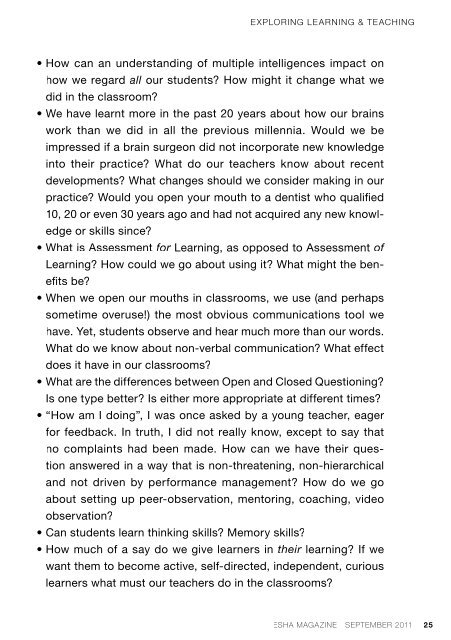Magazine - ESHA
Magazine - ESHA
Magazine - ESHA
Create successful ePaper yourself
Turn your PDF publications into a flip-book with our unique Google optimized e-Paper software.
• How can an understanding of multiple intelligences impact on<br />
how we regard all our students? How might it change what we<br />
did in the classroom?<br />
• We have learnt more in the past 20 years about how our brains<br />
work than we did in all the previous millennia. Would we be<br />
impressed if a brain surgeon did not incorporate new knowledge<br />
into their practice? What do our teachers know about recent<br />
developments? What changes should we consider making in our<br />
practice? Would you open your mouth to a dentist who qualifi ed<br />
10, 20 or even 30 years ago and had not acquired any new knowl-<br />
edge or skills since?<br />
• What is Assessment for Learning, as opposed to Assessment of<br />
Learning? How could we go about using it? What might the ben-<br />
efi ts be?<br />
• When we open our mouths in classrooms, we use (and perhaps<br />
sometime overuse!) the most obvious communications tool we<br />
have. Yet, students observe and hear much more than our words.<br />
What do we know about non-verbal communication? What effect<br />
does it have in our classrooms?<br />
• What are the differences between Open and Closed Questioning?<br />
Is one type better? Is either more appropriate at different times?<br />
• “How am I doing”, I was once asked by a young teacher, eager<br />
for feedback. In truth, I did not really know, except to say that<br />
no complaints had been made. How can we have their ques-<br />
tion answered in a way that is non-threatening, non-hierarchical<br />
and not driven by performance management? How do we go<br />
about setting up peer-observation, mentoring, coaching, video<br />
observation?<br />
• Can students learn thinking skills? Memory skills?<br />
EXPLORING LEARNING & TEACHING<br />
• How much of a say do we give learners in their learning? If we<br />
want them to become active, self-directed, independent, curious<br />
learners what must our teachers do in the classrooms?<br />
<strong>ESHA</strong> MAGAZINE SEPTEMBER 2011 25


